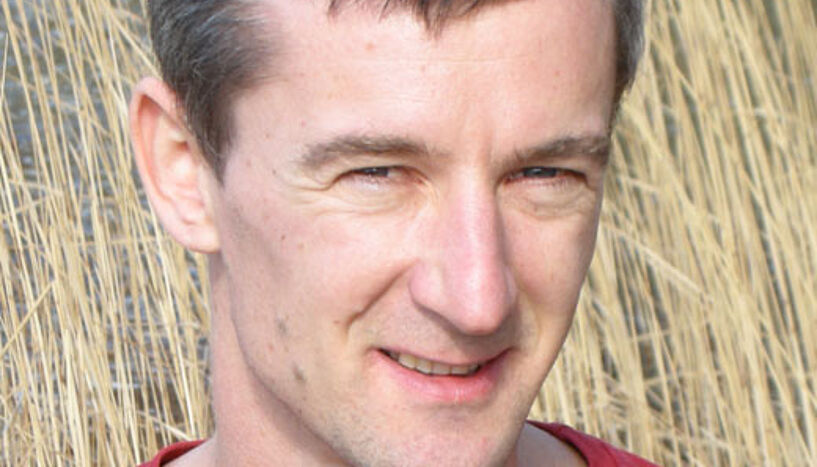The Evolution of Division of Labour
24. Januar 2012
Theoretical Biologist Claus Rueffler (photo private)
Division of labour is not only a defining feature of human societies but is also omnipresent among the building blocks of biological organisms and is considered a major theme of evolution. Theoretical Biologists Claus Rueffler and Joachim Hermisson from Vienna University in collaboration with Günter P. Wagner from Yale University identified necessary conditions under which division of labour is favoured by natural selection. The results of their study are published in the Proceedings of the National Academy of Sciences (PNAS).
Most animals and plants consist of a set of building blocks, also called modules. An obvious case in point are higher organisms that are collections of many cells of different types. The modular structure of biological organization is also visible at many other levels: several plant organs are derived from leafs, insects have segmented bodies and vertebrates have different appendages. Our teeth are yet another example for this modular structure.
Evolution Need not Lead to Specialization
What jumps to the eyes is that modules are commonly not identical but differ in form and function as is clearly visible in for instance the case of incisive and molars. Such modules are specialists, which together with other specialist modules collaborate within an organism. This possibility for division of labour is regarded as one of the main advantages of a modular structure and a major trend in evolution. On the other hand, many examples for organisms exist that consist of identical modules that jointly fulfil more than a single task. For example, some green algae are colonies of a few dozens of undifferentiated cells and each cell contributes to feeding, locomotion and reproduction. Similarly, millipedes and many primitive crustaceans consist of many undifferentiated body segments.
Conditions for Division of Labour derived from a Mathematical Model
"Under which conditions can we expect that division of labour evolves among the modules of an organism and when is functional specialization of modules prohibited? The answer to this question determines our understanding of why complex organisms have evolved in the first place and why not all organisms consist of collections of undifferentiated cells", explains Rueffler, lead author of the study from the University of Vienna. Rueffler looked at this problem by means of a mathematical model. Contrary to previous efforts concerning this subject, his model is not geared towards a specific system but concentrates on the underlying commonalities that are shared by all systems consisting of multifunctional modules. In this way he and his co-authors aim at pinpointing general underlying principles.
Specialists versus Generalists
Starting point is the observation that modules cannot be specialized simultaneously for alternative tasks but are limited by trade-offs: incisive are good at breaking up food items into pieces but not at grinding up food items into small pieces ready for digestion. The opposite holds true for molars. "The model answers the question, under which conditions an organism consisting of differentiated modules specialized for alternative tasks is superior to an organism consisting of generalist modules that can fulfil more than one task but only suboptimally so," argues Rueffler.
Causes for the Evolution of Division of Labour
A result of the model is that under very general assumptions the conditions leading to division of labour can be surprisingly restrictive. The reason is that due to trade-offs a high degree of specialization for one can be very costly in terms of loss of performance in alternative tasks. Furthermore, generalists have an advantage when damage to an organism resulting in the loss of specialized modules leads to a complete loss of function. Therefore, if division of labour has evolved strong alternative factors have to be present that act in favour of functional differentiation. Division of labour is for example to be expected when modules are predisposed to contribute to a particular function solely due to their position within the organism. Such "positional effects" were surely drivers in for example the differentiation of teeth. Another factor favouring a division of labour are synergistic effects between differentiated modules such that the performance of an organism is more than just the sum of the contribution of its parts.
The results of the study make plausible why despite a long evolutionary history still organisms of low complexity consisting of only a few cell types and with few or without any internal organs exist up to this day. The findings can now be used to study evolutionary trends in biological complexity across phylogenies.
Biographical Sketch of Claus Rueffler
Claus Rueffler studied biology und mathematics at the University of Kiel and received a PhD in theoretical evolutionary biology from Leiden University. He then worked as a postdoctoral fellow at the University of Toronto. Since 2008 Claus Rueffler is a junior group leader funded by the Vienna Science and Technology Fund (WWTF) working at the "Mathematics and Biosciences Group" at the Department of Mathematics of the University of Vienna.
For more information visit http://www.mabs.at/rueffler/index.html
Publication
Proceedings of the National Academy of Sciences (PNAS): Evolution of functional specialization and division of labor: Claus Rueffler, Joachim Hermisson (both University of Vienna), Günter P. Wagner (Yale University). January 2012.
DOI: 10.1073/pnas.1110521109
Scientific Contact
Dr. Claus Rueffler
Institute for Mathematics
University of Vienna
1090 Vienna, Nordbergstraße 15
T +43-1-4277-507 74
F +43-1-4277-9 506
claus.rueffler(at)univie.ac.at
Further enquiries
Mag. Veronika Schallhart
Öffentlichkeitsarbeit
Universität Wien
T +43-1-4277-175 30
M +43-664-602 77-175 30
veronika.schallhart(at)univie.ac.at
Wissenschaftlicher Kontakt
Dr. Claus Rueffler
Institut für MathematikUniversität Wien
1090 - Wien, Nordbergstraße 15
+43-1-4277-507 74
claus.rueffler@univie.ac.at
Rückfragehinweis
Mag. Veronika Schallhart
DLE ÖffentlichkeitsarbeitUniversität Wien
1010 - Wien, Universitätsring 1
+43-1-4277-17530
+43-664-8176793
veronika.schallhart@univie.ac.at
Downloads:
ClausRueffler_03.jpg
Dateigröße: 1,5 MB
